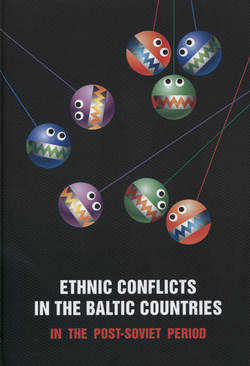Ethnic Conflicts in the Baltic States in Post-soviet Period

Реклама. ООО «ЛитРес», ИНН: 7719571260.
Оглавление
Сборник статей. Ethnic Conflicts in the Baltic States in Post-soviet Period
Foreword
Ethnic conflicts in post-soviet Baltic states: Content, form, mechanisms of formation, external influences. Dr. Ec. Alexander Gaponenko. President of the Institute of European Studies, Latvia
Ethno-political conflicts and national identity in Latvia. Dr. pol. Mihail Rodin. Institute of European Studies, Latvia
Research hypotheses
The results of the study. Political identity in the Latvian political process
Ethno-cultural identity in the Latvian political process
Ethnic conflict: causes and extent of leakage
The discussions and conclusions. Ethnic stratification and inequality in Latvia
National identity as a conflict-generating resource in Latvia
Conclusion
References
Baltic national minorities as victims of selective weapons of mass destruction. Vladimir Viktorovich Buzaev, Ph.D. in Geology and Mineralogy. Co-chairman of the Latvian Human Rights Committee
Demographic collapse
Mass non-citizenship
Status of languages of ethnic minorities
Limitation of education opportunities in ethnic minority languages
Historical memory in electoral behaviour in Latvia. Andrei Vladimirovich Solopenko, M.Soc.Sc., SKDS, Latvia
Introduction
Overall and territorial characteristic of Latvian population
Historical memory of people of Latvia
Voting behaviour of people in Latvia
Conclusion
References
Legal regulations of interethnic relations in European and Baltic countries. Associate Professor Konstantin Konstantinovich Matveyev. Baltic International Academy, Latvia
References
Experience of protecting Russian values using modern humanitarian technologies. Margarita Dmitrievna Dragile. Chairwoman of the Board of International Youth Organisation PEROM, Member of the Board of the Round Table of Russian Young People LatRusMol
Organisational model of campaign and coordination activities of the Support Committee
Ideological component of campaign
Ensuring mass campaign
Information support of the campaign
Main conclusions
Appendices. Native Language Campaign Committee Logo
Ribbon of United Latvian Nation
Stickers used in the campaign
Campaign flyers/posters
Strategy for victory in the Kazakova. The existing legal framework of ethnic domination. Elizabeth O. Krivtsova, Lawyer, human rights activist
Chronology of events
The legal side
Strategy and tactics of defense
Conclusion
Experience of legal support of referendum on status of Russian language in Latvia. Yelena Vyacheslavovna Bachinskaya, Master of Law
Glimpse at Estonia: politicisation and statistics as a tool of setting priorities in fight against discrimination. Andrei Sergeyevich Lobov, D. Eng. NKO “Russkaya Shkola v Estonii” (Russian School of Estonia) Member of the Board
Introduction
Role of politicisation of the issues related to ethnic Russian community of Estonia and how these issues manifest themselves
Inconspicuous minority or simulation of right protection activities
Statistics as a tool for setting priorities in the fight against discrimination
Conclusions
Brief history of latgalians as a part of various state formations. Arvids Turlais, founder of the Union of Latgalians
Discrimination in Estonia. Mstislav Yuryevich Rusakov, Kitezh Human Rights Centre Director, NPO “Russkaya Shkola v Estonii” (Russian School of Estonia) Chairman of the Board
Background
Russian Ombudsman vs. Transparency International
Case of Russian army pensioners
Litigation in courts of second and highest instances
Some progress at last…
Complaints to European Court of Human Rights
Violation of Article 1 of Protocol 1 of Convention
Pension as property
Violation of public interest
Violation of law
Violation of principles of international law
Violation of Article 14 of Convention in combination with Article 1, Protocol 1 of Convention
Bronze nights in Estonia – ethnic background of the events. Maxim Reva, The Night Watch, Estonia
“Humanity of versus national state” Sergey Seredenko, lawyer, human rights activist. Estonia
The struggle for Russian school in Lithuania. Ph.D. А.V. Fomin, teacher, Chairman of Klaipeda. Association of Teachers of Russian schools in Lithuania
The elimination of higher education in Russian
Drama of Russian school. Act one: the destruction of the structure
Drama of the Russian school: content of education
Drama of the Russian school: attack to training language
Russian drama school: the Lithuanian language exam
Poles in Lithuania: conflict history. Jaroslav Skuder, lawyer, Lithuania
The setos people – history and modernity. Yury Vladimirovich Alekseev, Researcher, Russia
History
Period I (before the X century AD)
Period II (X century – early XIII century)
Period III (XIII century – 1550s)
Period IV (1550s – 1700s)
Period V (1700s – 1919)
Period VI (1920–1944)
Period VII (from 1945)
Modernity
Conclusions
Отрывок из книги
The USSR had existed for three quarters of a century. For all that time, the ruling Communist elite conducted a policy of formation of a single political nation out of the extremely ethnically heterogeneous population of the country. This nation was called ‘Soviet people’, which was not a correct term from the point of view of modern science.
The Soviet nation was built based on the principles of internationalism, i.e. equality of all ethnic groups. To ensure such equality, during the Communist years most of those ethnic groups received their own state education: Soviet and autonomous republics, districts and at some point even regions and townships. As a part of the state education, those so-called main ethnic groups were able to develop their languages and culture freely, open schools and universities, have their own media and publish books, newspapers and magazines in their languages. Many ethnic groups received their written language for the first time. Ethnic groups that were not considered main also were present in the ethnic formation provided by the state. They had a lower social status and considerably less opportunities for their ethnic development.
.....
* Presented only positive answers: “The confrontation is possible,” “Confrontation in unlikely.“
As the data in Table 3, in the case of a possible confrontation is only a small part of the 7.7 % of respondents (mainly from the non-titular nation), oriented to overt physical collision. Basically, according to the respondents, in case of a possible confrontation will only acute oral exchange (43.3 %).
.....